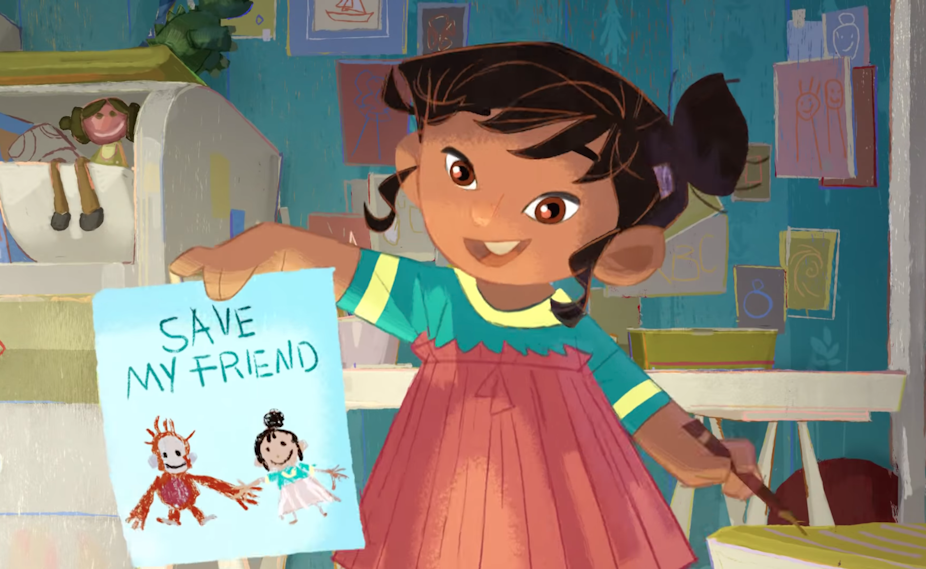The supermarket chain Iceland has been denied clearance to screen its Christmas advert on British television. Consisting mainly of Greenpeace’s short “Rang-tan” animation, the ad highlights Iceland’s commitment to eliminate palm oil from its own-brand products. According to the advertising clearing body, Clearcast, it was disallowed not because of its content, but because of its connection with Greenpeace, a “body whose objects are wholly or mainly of a political nature”.
Iceland reacted swiftly, tweeting that its ad had been “banned” from television because it was “seen to be in support of a political issue”. The tweet was picked up by mainstream media such as the Guardian, which ran the headline: “Iceland’s Christmas advert banned for being too political.” Furious responses followed, with nearly 100,000 people sharing Iceland’s original tweet and over 650,000 petitioning Clearcast to reverse its decision.
Most of these responses revolve around the (inaccurate but powerful) claim that Iceland’s ad was “banned” for being “political”. How, ask critics, could highlighting the destruction of the rainforest be political? How could saving orangutans be anything but worthwhile? As one tweet put it, “since when is outrage about losing such beautiful animals political?”
Such responses portray environmental and conservation causes as above politics: as built on unquestionable, universal truths. As such, they are too important to be used for petty point-scoring. In this view, Iceland’s ad reveals a devastating apolitical reality that the world needs to see and respond to.
People live in those forests too
But show the same footage to rural communities on the islands of Borneo and Sumatra, where most palm oil is produced, and we may well get a different response. Many would see the ad’s message as entirely political, for several reasons.

The forests that the ad exhorts viewers to save are also these people’s homes: places filled with specific histories, social relations, assets and other living beings. But the relationships that forest dwellers have to these places are not always understood or recognised by the state or conservation bodies. Wildlife protection laws and the expansion of protected areas – often driven by conservation initiatives – have complicated the situation. These have turned access to forests and their resources into highly political issues.
Many rural villagers across Indonesia and Malaysia also rely on small-scale cultivation of oil palm (the tree which produces palm oil) for their livelihoods. Some smallholders work for or in partnership with oil palm companies, and others operate independently. While participation in the industry has generated its own problems, it has also generated income and infrastructure in rural areas. Such smallholders will be rightly concerned about the damaging effects of attacks on palm oil on their futures, and their access to necessities like food and medicine.

The Iceland ad is also a classic example of how life is unequally valued across the global political terrain. In certain parts of Borneo and Sumatra, where my team and I are currently conducting research, many forest residents see orangutans as dangerous and not particularly special creatures that can damage their crops and livelihoods. Yet they are acutely aware that many well-meaning foreigners would privilege the well-being of orangutans over their own. Why, they ask, do governments, NGOs and tourists put so much time and money into saving this one animal when people like us are struggling to get by?
Read more: Palm oil boycott could actually increase deforestation – sustainable products are the solution
‘Humans’ and ‘nature’ cannot be easily separated
Such concerns reveal a mismatch between Iceland’s conservation message and the experiences of rural people in Borneo and Sumatra. In Greenpeace’s film, humans are either intruders (represented by bulldozers) in the pristine rainforest home of the orangutan, or the “good guys” (represented by the girl) who are going to save them. This vision is built on a historically Western understanding of the world that treats “humans” and “nature” as fundamentally separate. But what it blots out are the people who live in and around the same forests, for whom such a separation is much harder – and by no means apolitical.
The idea that environmental and conservation causes are above politics thus makes sense only from a particular Western perspective – one built around an image of the forest-as-wilderness that is not universally shared. The depiction of such causes as apolitical has facilitated their spread across the world, while shielding them from scrutiny and critique. Yet scrutiny and critique can reveal significant problems and oversimplifications in Iceland’s ad.
The “palm oil kills orangutans” narrative, for example, sidesteps the fact that deforestation is only one of several factors driving orangutan extinction. Other key drivers include hunting and poaching, though these won’t be solved by oil palm activism. And as various analysts have pointed out, simply boycotting palm oil could ultimately backfire. A collapse in global demand would disproportionately affect smallholders, generating further poverty and resentment. It could also encourage the cultivation of other ecologically-damaging crops such as soy or rapeseed, which would displace rather than reduce forest conversion and biodiversity loss – an unfortunate geopolitical outcome.
None of this mitigates the need to address the problems of environmental destruction and extinction. And it’s no bad thing that Iceland’s ad has helped raise awareness of these issues. But conservation isn’t a black-and-white morality tale, and depicting the advert’s message as apolitical is both misleading and counterproductive. For the sake of both orangutans and the people who share their forests, we need fewer emotive simplifications and more acknowledgement of the complex political realities at stake.

